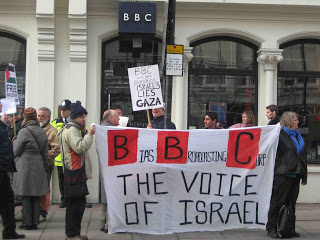


Don’t Fund the BBC’s Bias Against Claimants and Palestine
Don’t Pay the Licence Fee – Donate it to a Palestinian Charity
An excellent article by Mick Hall of Organised Outrage on how the BBC’s Complaints System is deliberately designed to frustrate complainants and prevent complaints succeeding, which is why a negligible proportion ever actually succeed.
Palestine solidarity activists know full well that however biased the BBC is it will always be allowed to faithfully mirror the foreign policy of the government of the day. Hence on Palestine it is 100% Zionist these days and its appalling coverage of Israel’s murderous attack on the Gaza Flotilla still resonates, in particular the appalling Death in the Med Panorama programme which got an ‘exclusive’ with the murderers. They were allowed to testify to Panorama but not even to an Israeli Government Inquiry!! Presumably Mark Thompson and his outfit are considered more reliable.
There is only one answer. Don’t get a BBC licence. Let the bastards pay for their own propaganda. I don’t pay for one, not that I watch the BBC that much anyway. Some say that the BBC is better than Fox. Maybe it is, but people at least understand that Fox is biased whereas the BBC pretends to be unbiased and impartial.
And if they do make it through to the BBC Trust, then the upper class politicians who dominate proceedings, as Mick says you don’t find any workers there, ensure that a complaint is sat on. So you may have seen last year an appalling programme where a US ‘welfare expert’ came over to Liverpool to spread the message that ‘tough love’ was needed if capitalism and the bankers were to survive.
No opposition was allowed to this man and the BBC were happy to act as the Tory/New Labour medium in attacking the unemployed and poor.
Tony Greenstein
Posted: 03 Jan 2012 04:42 AM PST
Dictionary definition of a Debate.
A formal discussion on a particular topic in a public place in which opposing arguments are put forward.
I have spent the last eleven months pursuing a complaint through the BBC’s byzantine complaints system, to say it was like pulling teeth would be an understatement. Given the public disquiet about the way the UK press is regulated in house, which was generated by the News International phone hacking scandal. Perhaps it is time the BBC complaints procedure came under the spotlight, as it’s undoubtedly no more accountable. Just as senior newspaper executives and editors have the final say at the PCC, so too do senior BBC executives and their place-men in the BBC complaints procedure. If there is clear blue water between how these two complaints procedures operate, I fail to see it.
Even when a BBC apparatchik led me to believe they agreed with the substance of my complaint, I came up against a corridor of mirrors. “Of course we sympathize,” they wrote, but you must follow our procedure, as I was shuffled out one door, into the next, marked, next stage of the our tortuous procedure. There is no doubt in my mind this long drawn out bureaucratic process is solely designed to protect the reputation of the BBC and exhaust and demoralize all but the most determined complainants.
Briefly my complaint was critical of BBC TV’s Newsnight, for commissioning Professor Lawrence Mead to come to the UK to make a short film advocating workfare, an issue which at the time was about to impact detrimentally on some of the most economically disadvantaged people in the nation. After his video clip was broadcast on Newsnight, (16.2.11) it was followed by a studio debate, if one can call it that, as only Mead and Chris Grayling took part, with Paxman in the chair. As Grayling was the Coalition Minister of State at the Department of Work and Pensions, tasked with the introduction of a form of workfare in the UK; and Mead provided the main theoretical cover for workfare, which aims to limit those who can claim unemployment benefits, it was hardly surprising the debate turned out to be a very one sided affair.
With Mead the main academic advocate for workfare in the USA, and Grayling the coalition minister tasked with introducing it here, one would have expected Newsnight to provide an alternative viewpoint. The more so as workfare in the state of Wisconsin, where it was first trialed, has proven disastrous for some of the most socially deprived people in the State. For example Mead claims in Wisconsin workfare cut the unemployed benefit roll by 90% and in the discussion which followed his video, all three of the participants agreed this was a great success. One expected little from Mead and Grayling, but at the very least Mr Paxman should have asked what happened to these former claimants, did they gain employment, enter further education or a programe of retraining?
Research showed this was not the case, as they disappeared from all public records, presumable having fallen into an anonymous black void of demoralization and hopelessness. I waited in vain for Paxman to say, “Any fool can cut the number of welfare benefits claimants, if you set the bar so high, only a tiny minority become eligible to claim them.”
Newsnight’s failure to allow an opposing voice into the debate, meant the programe did not live up to BBC’s impartial guidelines. Rather than providing a debate in which workfare was stress tested, something which at that time was desperately needed, Newsnight on the night of February 16th, appeared to be more like a Coalition government promo for workfare, a softening up of the British public before the coalition’s benefit cuts took affect,
Indeed this lack of an independent impartial voice is not dissimilar to the BBC complaints procedure itself. Indeed it is indicative that some of those who sit on the BBC Trust which oversee the complains procedure, also hold or have held positions on those paragons of virtue and fairness, the Press Complaints Commission and the Police Complaints Commission.
For example the trust members who finally rubber stamped my complaint as rejected, included a consultant and trainer to the Press Complaints Commission, a banker, and director of a private transnational security firm, which has an unsavory reputation, and the founder and senior executive of a major media production company which provides the BBC with programs.
Of course none of the aforementioned would exclude them from this office, indeed in today’s world it might ensure they got the job. But it does question their ability to act in a fair and impartial way, not least because they have a top down mentality and were appointed to the Trust by the governments of the day, the very same people who since 1997 have strained at the leash to introduce workfare.
David Liddiment.
A former senior TV executive who went on to CO-found All3Media, which has a turnover of £241.6m, and for which he acts as Creative Director. According to the company’s web site, over the six years since it’s foundation, it has grown both organically and by acquisition to become the largest independent production house in the UK. It produces some of the BBC’s most popular programs including Inspector George Gently, and the Shadow Line. Despite the quality of the aforementioned programes, I do not feel it is being unfair to claim
this company has done more to dumdown British TV, than any other content producer bar Simon Cowell’s company Syco Television. Talk about letting the fox into the hen house.
Alison Hastings.
Runs a media consultancy. She is also a consultant to Camelot, and consultant to and member of the infamous Press Complaints Commission.
Richard Ayre.
Former senior BBC executive who worked for the corporation for over 30 years, on leaving the corporation became an active quangoites. How he can justify his membership of the Trust is beyond me. That a former BBC’s Controller of Editorial Policy and Deputy Chief Executive of BBC News can sit on the Trust reeks of the same sharp practice which has made the Press Complaints Commission unfit for purpose.
Anthony Fry.
An Investment banker and promoter of hedge funds, need I say more, who also works in business as a non executive director, one of the guys who are tasked with setting the pay of CEO’s and senior management, the type who sat on their hands whilst senior executive salaries, including their own, went into the stratosphere and made the UK one of the most unequal societies in the EU. He is also a director of Control Risks, a private security firm which has contracts in most of the worlds trouble spots, including Iraq and Afghanistan, and which hires out mercenaries to offer protection in war zones.
Mehmuda Mian.
When you read her biog. one wonders how she got the job, a competent lawyer who is regarded by power elites as a safe pair of hands and was made a Commissioner to the Independent Police Complaints Commission. It is difficult not to conclude she was appointed to be a BBC trustee to make up the ethnic mix.
The fact not a single working class person sits on this panel or the Trust as a whole, is par for the course these days, but to ask a banker, a former senior BBC executive, a member of the press complaints commission which failed so dismally over the phone hacking scandal, and a man who gains a sizeable portion of his wealth from the BBC, the very organization I am complaining about is appalling, if a little surreal, as it sums up perfectly why the system is stacked against an ordinary complainant. To say the least, this is not a system where your complains are judged by a panel of your peers.
If you add in the fact my complaint centers on workfare, a 19th century blow back of a theory which is ultimately designed to help do away with the welfare state; and it beggars belief.
Perhaps readers might get a glimpse of the contempt I have for the BBC’s complaints procedure and the Trust members who over see it, if they read comments made by Richard Hutt, the BBC’s complaints director in a letter to me informing me the Trust had rejected my complaint.
“Turning to your complaint regarding the discussion that followed the report, I note your principle concern was the choice of guests-Professor Mead himself and Chris Grayling, MP, who you identified as a strong advocate for Pro Meads theories.
I would say first the inclusion of a guest who was able to debate the implications of welfare reform and the arguments of Professor Mead would have added depth to the discussion.”
After recognizing this fact, any honest fair minded person would have found in favor of my complaint, but not Mr Hutt and the Trust members who rubber stamped his decision. As I mentioned above assessing independently is not their role as the complaints system is designed to protect the reputation of the BBC.
Incidentally, the Trust members who sat on the panel which finally endorsed the rejection of my complaint, receive an annual payment of between £35,935–£41,070 p.a. plus liberal expenses, for working at most a two day week. So it seems unlikely they will be forced on to workfare, or pressurised to take a causal, low paid job, with the threat of losing their job seekers allowance.
The decision to reject my complaint was agreed by the Trust at their December meeting. It can be read here under the header Newsnight, BBC Two, February15 2011, its on pages 44-47.
Mick Hall



